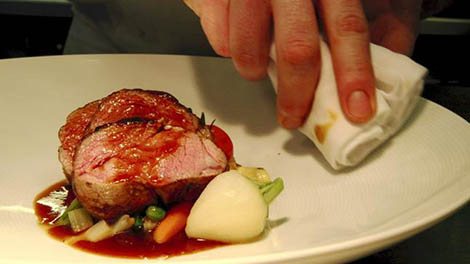Finally food takes centre stage in fine dining
Australian fine dining is now less about white tablecloths and fancy paintings and more about fresh, local produce, dining experts say.
"We're seeing a produce-driven thing," renowned critic Terry Durack says. "Fine dining for a long time was about the dining experience and not so much about the produce itself. And that to me has been one of the biggest changes in fine dining."

Renowned food critics Jill Dupleix and Terry Durack say fine dining in Australia is now less about the decor and entirely about the food. Photo: Jessica Shapiro
Durack, the director of The Australian Financial Review Australia's Top Restaurants, presented by Qantas Airways and Vittoria Coffee, says traditionally most of the top fine dining restaurants served the same ingredients, influenced mainly by French cuisine and dinner cuisine that didn't really come from our time or place.
"Now [we are] being inspired by chefs like (Rene) Redzepi in Copenhagen, and various chefs around the globe that say 'look around you, look what's growing around you'," Durack says.
"Cultivate an association with the growers, with the fisherman, get to know what's in season, when and how can you actually get the most out of that."
Over the next three months, chefs and restaurateurs from 500 premium venues, selected by Fairfax media critics, will be able to vote for their top 100 favourite restaurants across the nation.
The results will form a list of Australia's top 100 restaurants.
Renowned food writer, critic and award director Jill Dupleix says she's been in more fine dining restaurants in her life than she had wanted to be in.
"I became bored silly with the pretentiousness, overpriced, egotistical installations of art, the unnecessary expense of trappings which really added little to my enjoyment," Dupleix says.
"What's coming through now is, because it's a more chef-driven industry than a restaurateur industry, the things that are important to chefs are coming through rather than the things that important to restaurateurs. That means deliciousness, that means great produce, that means them really trying to work out who they are and cook accordingly. That to me is the key change and that makes it so exciting."
Dupleix says the global financial crisis was the best thing to happen to the Australian restaurant industry.
"They [restaurateurs] really had to knuckle down and work out what was important and what they could do without," Dupleix says.
"They can do without table cloths, they save a fortune in laundry bills and they have decided they are going to be more honest, more direct, more spontaneous, with what they do. We are going to collaborate more with chefs, we are going to interact more with our customers. That has made so-called fine dining so much more fun."
Chef Federico Zanellato, from LuMi restaurant in Sydney also says that over his 15 years in the industry he has seen significant change in the way Australians approach food.
"They just want good food at reasonable prices," Zannellato says.
"The most important this for the customer is that the food needs to taste great, then the wine, the service, the decor come after that."
For Joel Valvasori-Pereza, chef at Lalla Rookh in Perth, said there is a fine balance to delivering food that is on trend and pleasing a maximum number of people.
"Whatever it is you do, you have to do it really well," he says.
"Flavour has to happen. That's going to win over something that looks pretty."
Voting for the awards has begun with the winners announced in May.
Source : The Financial Review Lucille Keen 23rd February 2015







